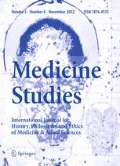Abstract
Purpose
This paper presents an ethnographic study of gamete donation in Latvia. The aim of the study is to describe and analyse the practice of applying responsibility in gamete donation cases from the perspective of anthropology and ethics.
Methods
We performed thirty semi-structured interviews with laypeople and five focus group discussions among adolescents. The third source of data was media analysis: 57 articles discussing assisted reproduction in Latvian electronic popular media as well as internet discussions among ART participants. The data were processed using Atlas.ti.
Results
The data showed that the situation of ART responsibility is formulated through defining one’s relationship to the gametes, to the nation and the relationship between parent and child.
Conclusions
The practice of gamete donation does not create new responsibilities but uses already existing relations in a situation marked by new knowledge. Relationships among ART users, donors and physicians often result in an imbalance of responsibility sharing. The framework of relational ethics is one possible way to change the practice of balancing and sharing responsibility in ART applications.
Similar content being viewed by others
Notes
Project contract No. 2009/0224/1DP/1.1.1.2.0/09APIA/VIAA/055, project web page http://www.biodrosiba.lu.lv/eng/.
References
Austin, Wendy, Vangie Bergum, and John Dossetor. 2003. Relational ethics. In Approaches to ethics, ed. Verena Tschudin, 45–52. Edinburgh: Butterworth-Heinemann.
Bayne, Tim. 2003. Gamete donation and parental responsibility. Journal of Applied Philosophy 20(3): 77–87.
Callahan, Daniel. 1992. Bioethics and fatherhood. Utah Law Review 3: 735–746.
Carsten, Janet. 2000. Introduction: Cultures of Relatedness. In Cultures of relatedness, ed. J. Carsten, 1–36. Cambridge: Cambridge University Press.
Christman, John. 2004. Relational autonomy, liberal individualism, and the social constitution of selves. Philosophical Studies: An International Journal for Philosophy in the Analytic Tradition 117(1/2): 143–164.
Derrida, Jacques. 1995. The gift of death. Chicago: The University of Chicago Press.
Ehrich, Kathryn, Clare Williams, Bobbie Farsides, Jane Sandall, and Rosamund Scott. 2007. Choosing embryos: Ethical complexity and relational autonomy in staff accounts of PGD. Sociology of Health & Illness 29(7): 1091–1106.
Edwards, Jeanette. 2000. Born and Bred: Idioms of kinship and new reproductive technologies in England. Oxford: Oxford University Press.
Franklin, Sarah. 1997. Embodied progress: A cultural account of assisted conception. London: Routledge.
Gatens, Moira, and Genevieve Lloyd. 1999. Collective imaginings: Spinoza, past and present. London: Routledge.
Mackenzie, Catriona, and Natalie Stoljar. 2000. Introduction: Autonomy Reconfigured. In Relational autonomy: Feminist perspectives on autonomy, agency and the social self, ed. Catriona Mackenzie, and Natalie Stoljar, 3–31. New York: Oxford University Press.
Sargent, Carolyn F., and Carolyn M. Smith-Morris. 2006. Questioning our principles: Anthropological contributions to ethical dilemmas in clinical practice. In Cambridge Quarterly of Healthcare Ethics 15: 123–134.
Schneider, David M. 1980 [1968]. American kinship: A cultural account. Chicago: University of Chicago Press.
Shore, Cris. 1992. Virgin births and sterile debates: anthropology and the new reproductive technologies. Current Anthropology 33(3): 295–301.
Smith-Morris, Carolyn M. 2007. Autonomous individuals or self-determined communities? The changing ethics of research among Native Americans. Human Organization 66(3): 327–336.
Steinbock, Bonnie. 2005. Defining parenthood. International Journal of Children’s Rights 13: 287–310.
Strathern, Marylin. 1992. After nature: English kinship in the late twentieth century. Cambridge: Cambridge University Press.
Strathern, Marylin. 2005. Kinship, law and the unexpected. Cambridge, New York: Cambridge University Press.
Weinberg, Rivka. 2008. The moral complexity of sperm donation. Bioethics 22(3): 166–178.
Author information
Authors and Affiliations
Corresponding author
Rights and permissions
About this article
Cite this article
Mezinska, S., Mileiko, I. & Putnina, A. Sharing Responsibility in Gamete Donation: Balancing Relations and New Knowledge in Latvia. Medicine Studies 3, 185–196 (2012). https://doi.org/10.1007/s12376-011-0071-7
Received:
Accepted:
Published:
Issue Date:
DOI: https://doi.org/10.1007/s12376-011-0071-7




